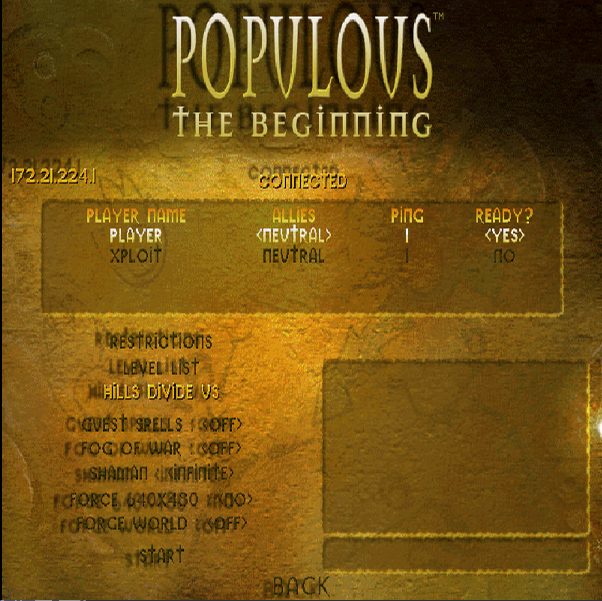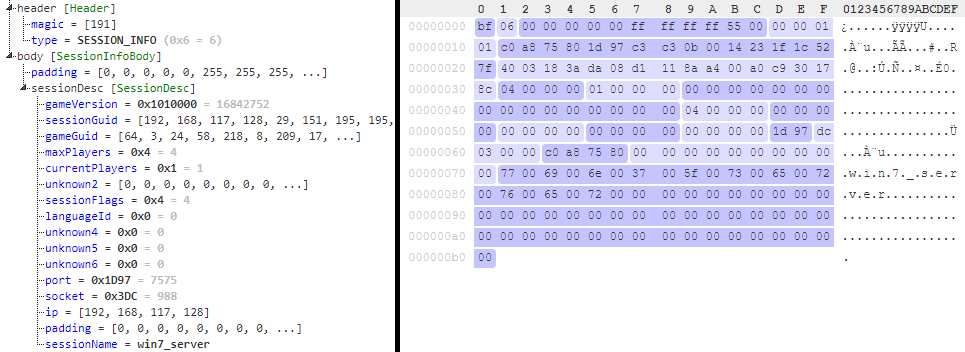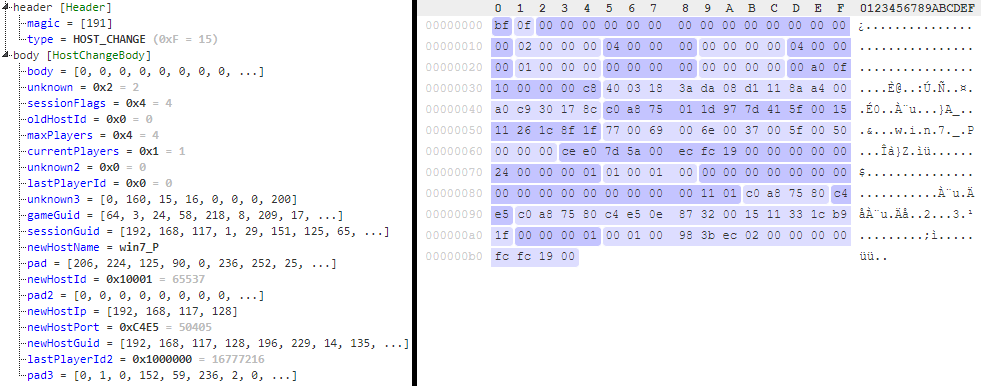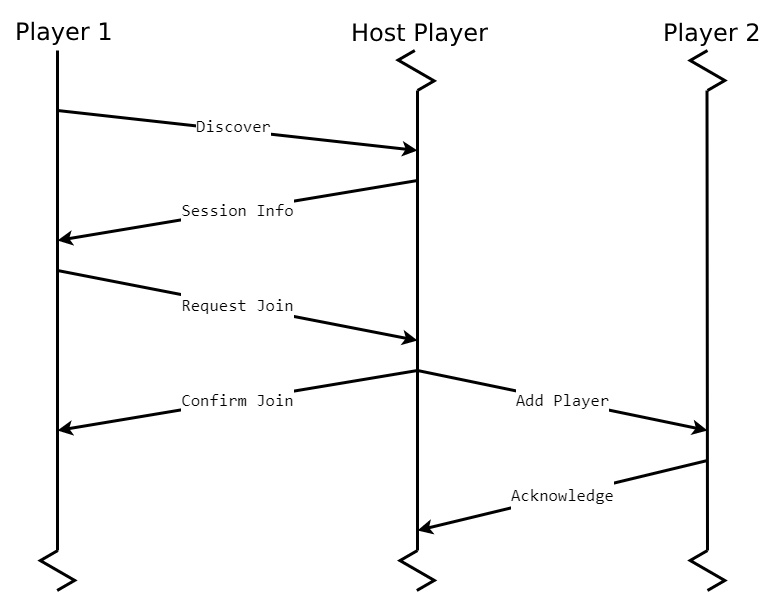Reverse engineering Populous: The Beginning's lobby networking
Populous: The Beginning is a PC game from 1998 I used to play when I was young so as a fun side project I decided to reverse engineer the network protocol used in the lobby and find some vulnerabilities in it. As a side note, all of this research happened more than 2 years ago but I finally decided to organize it.
It's an old game with the expectation of playing multiplayer in a LAN environment so there's not really a server and a player is selected as the host and takes the lobby management role. The game's lobby-related functionality is very basic, you select a lobby, called a session, to join from a list and, once you are in, there's basic information about other players, a chat and some game-related configuration options.
Reconnaissance and analysis
My first step was getting the game from GOG for like 2€. Then I opened any executable file that seemed interesting in IDA until I found WEANETR.dll which is responsible for all the networking-related functionality.
After opening the DLL in IDA I skimmed the code and quickly noticed there were calls to a logging function which was not part of the release. To get a better idea of the functionality in a dynamic way I wrote a Frida script to hook those logging calls and the sendto/recvfrom functions.
var baseAddr = Module.findBaseAddress('WEANETR.dll');
console.log('WEANETR.dll baseAddr: ' + baseAddr);
var log_null_sub_3 = resolveAddress('0x10001020');
Interceptor.attach(log_null_sub_3, {
onEnter: function (args) {
var args_0 = args[0].readCString();
var split_args = args_0.split('%');
var print_string = split_args[0];
for (var i = 1; i < split_args.length; i++) {
switch (split_args[i][0]) {
case 's':
print_string += args[i].readCString() + split_args[i].substring(1);
break;
case 'd':
print_string += args[i].toInt32() + split_args[i].substring(1);
break;
default:
print_string += '[Unknown format]' + args[i] + split_args[i].substring(1);
}
}
console.log('[+] Log: ' + print_string.trim());
},
});
var sendto_wrapper = resolveAddress('0x10010850');
var recvfrom_wrapper = resolveAddress('0x100108B0');
Interceptor.attach(sendto_wrapper, {
onEnter: function (args) {
var local_port = swap16(ptr(args[0]).readU16());
var to_port = swap16(ptr(args[1]).readU16());
var to_ip_string = int2ip(swap32(ptr(args[1]).add(6).readU32()));
console.log('[+] Sent: ' + local_port + ' --> ' + to_ip_string + ':' + to_port)
console.log('[+] Return: ' + this.returnAddress + ' ThreadId: ' + this.threadId);
console.log(hexdump(ptr(args[2]), {
offset: 0,
length: args[3].toInt32(),
header: true,
ansi: true
}));
},
});
Interceptor.attach(recvfrom_wrapper, {
onEnter: function (args) {
this.recvbuf = ptr(args[0]);
this.sock_obj = ptr(args[2])
this.from_obj = ptr(args[3]);
},
onLeave: function (retval) {
var from_port = swap16(this.from_obj.readU16());
var from_ip_string = int2ip(swap32(this.from_obj.add(6).readU32()));
var local_port = swap16(this.sock_obj.readU16());
console.log('[+] Received: ' + local_port + ' <-- ' + from_ip_string + ':' + from_port);
console.log('[+] Return: ' + this.returnAddress + ' ThreadId: ' + this.threadId);
var recv_len = retval.toInt32();
if (recv_len < 0) {
console.log('Error: ' + recv_len);
} else {
console.log(hexdump(this.recvbuf, {
offset: 0,
length: recv_len,
header: true,
ansi: true
}));
}
},
});
Now while interacting with the lobby I could see the output of each log and the packets being sent and received.
After all of that, it was time to start reverse engineering for real.
Reconstructing network related structures
This part is basically about reading decompiled code and understanding what it is doing, there's no secret, every function will give you a hint on what a structure is used for and that hint can help you understand a different function. I'm going to list some of the most relevant structures I reconstructed and add a comment about any interesting fields.
Player's description
struct PLAYERDESC
{
wchar_t name[16];
uint id;
uint unknown;
uint unknown2;
uint unknown3;
uint unknown4;
byte flags;
byte slot;
uint ip;
ushort port;
char guid[16];
char pad[3];
};
- id: derived from player slot.
- flags: has info about the player's status: ready, in-game, ...
- slot: position in the session.
- guid: generated from IP and date of connection.
My player's description
struct MYPLAYERDESC
{
GAME_FLAGS flags;
uint id;
uint slot;
char pad[33];
};
- flags: has info about my player's status: is hosting the game, is a player, in-game, ...
Session's description
struct SESSIONDESC
{
uint game_verison;
char session_guid[16];
char game_guid[16];
uint max_players;
uint current_players;
char unknown_guid[16];
uint session_flags;
uint language_id;
uint unknown4;
uint unknown5;
uint unknown6;
BF_Socket socket;
char padding[10];
wchar_t name[16];
wchar_t unknown_pad[16];
};
- game_version: 1.1 base game or 1.2 with Undiscovered Worlds expansion.
- game_guid: identifies the game Populous: The Beginning since it looks like the network protocol is shared with Dungeon Keeper 2.
- session_flags: info about the session such as: open to joining, has password, ...
Network information
struct NETWORKADDRESS
{
char BF_Header[2];
__int128 BFSGUID;
char *IP_StringPTR;
size_t IP_StringLength;
ushort Port;
char pad[4];
ushort Zero;
char IP_String;
};
- BF_Header: constant chars 'BF' probably identifies the company Bullfrog Productions.
- BFSGUID: indicates what protocol stack to use but only supports UDP/IP.
General game's network information
struct NetworkServiceProvider
{
NetworkServiceProvider_vtbl *__vftable /*VFT*/;
int always_zero;
CRITICAL_SECTION CriticalSection;
int is_initialized;
PLAYERDESC *player_list;
uint host_id;
void *callback_parse_packet;
BF_NetworkAddress *networkAddress;
char player_guid[16];
__int128 game_guid;
uint host_ip;
ushort host_port;
char pad3_2[280];
HANDLE StartThread_event;
HANDLE KillThread_event;
HANDLE GuaranteedThread_event;
HANDLE service_provider_thread;
char pad4[4];
SESSIONDESC sessiondesc;
GAMEDESC game_desc;
char pad5[457];
wchar_t session_password[32];
char *debug_server_struct;
char *recv_buffer;
uint last_player_id;
LPWSADATA lpWSAData;
BF_Socket recv_socket;
char pad7[74];
};
- callback_parse_packet: callback to the function in the main executable responsible for in-game packet parsing.
- debug_server_struct: points to a debugging structure used for connectivity tests.
- recv_buffer: the buffer where the current network packet is stored.
Network vtable
struct /*VFT*/ NetworkServiceProvider_vtbl
{
void *Initialize
void *ShutDown;
void *SetupConnection;
void *EnumerateLocalServices;
void *AreWeLobbied;
void *EnumerateLobbyApplications;
void *RunLobbyApplication;
void *CreateSPSession;
void *JoinSPSession;
void *DestroySPSession;
void *EnumerateSession;
void *EnableNewPlayers;
void *EnumeratePlayers;
void *SendMessage;
void *SendMessageTo;
void *ReadSPMessage;
void *ChangeHost;
void *SendMSResults;
void *EnumerateNetworkMediumsModem;
void *EnumerateNetworkMediumsDPlay;
void *CreateNetworkAddress;
void *GetPlayerSlot;
void *ParseDatagram;
};
- EnumerateLobbyApplications, RunLobbyApplication, EnumeratePlayers, EnumerateNetworkMediumsModem & EnumerateNetworkMediumsDPlay: not implemented for this protocol stack.
- ReadSPMessage: receives, parses and interpretes packets related to the lobby.
- ParseDatagram: receives in-game packets and sends them to the main executable.
These are all the main structures that I used to understand the code's functionality. Now let's move to the network packets used in this game, I decided to refer to the protocol as BF protocol due to its header magic.
BF protocol packets
I'm a big fan of Kaitai Struct for creating packet definitions and easy parsing so I created a KSY file that defines the main packets used in the lobby.
meta:
id: bf_packet
endian: le
seq:
- id: header
type: header
- id: body
type:
switch-on: header.type
cases:
'packet_type::discover': discover_body
'packet_type::session_info': session_info_body
'packet_type::request_join': request_join_body
'packet_type::confirm_join': confirm_join_body
'packet_type::leave_session': leave_session_body
'packet_type::chat': chat_body
'packet_type::datagram': datagram_body
'packet_type::session_players': session_players_body
'packet_type::acknowledge': acknowledge_body
'packet_type::host_change': host_change_body
'packet_type::destroy_player': destroy_player_body
'packet_type::add_player': add_player_body
types:
header:
seq:
- id: magic
contents: [0xBF]
- id: type
type: u1
enum: packet_type
add_player_body:
seq:
- id: pad
size: 19
- id: max_players
type: u4
- id: current_players
type: u4
- id: pad2
size: 16
- id: game_guid
size: 16
- id: session_guid
size: 16
- id: player_list
type: player_info
datagram_body:
seq:
- id: pad
size: 1
- id: sender_slot
type: u4
- id: destination_slot
type: u4
enum: receiver_type
- id: len
type: u2
- id: message
type: datagram
size: len
chat_body:
seq:
- id: pad
size: 1
- id: sender_slot
type: u4
- id: destination_slot
type: u4
enum: receiver_type
- id: len
type: u2
- id: message
type: str
size: len
encoding: UTF-16
discover_body:
seq:
- id: padding
size: 11
- id: game_guid
size: 16
session_info_body:
seq:
- id: padding
size: 11
- id: session_desc
type: session_desc
request_join_body:
seq:
- id: padding
size: 15
- id: game_guid
size: 16
- id: session_guid
size: 16
- id: player_guid
size: 16
- id: player_name
type: str
size: 32
encoding: UTF-16
- id: password
type: str
size: 64
encoding: UTF-16
confirm_join_body:
seq:
- id: padding
size: 15
- id: game_guid
size: 16
- id: session_guid
size: 16
- id: player_guid
size: 16
- id: player_id
type: u4
- id: host_id
type: u4
- id: max_players
type: u4
- id: current_players
type: u4
- id: padding2
size: 16
destroy_player_body:
seq:
- id: padding
size: 15
- id: packet_id
type: u4
- id: max_players
type: u4
- id: current_players
type: u4
- id: padding2
size: 16
- id: game_guid
size: 16
- id: session_guid
size: 16
- id: padding3
size: 16
- id: player_id
type: u4
leave_session_body:
seq:
- id: padding
size: 43
- id: game_guid
size: 16
- id: session_guid
size: 16
- id: player_guid
size: 16
- id: player_id
type: u4
session_players_body:
seq:
- id: pad
size: 11
- id: packet_id
type: u4
- id: player_id
type: u4
- id: max_players
type: u4
- id: current_players
type: u4
- id: pad2
size: 16
- id: player_list_len
type: u4
- id: player_list
type: player_info
repeat: expr
repeat-expr: player_list_len
- id: pad3
size-eos: true
acknowledge_body:
seq:
- id: pad
size: 1
- id: sender_slot
type: u4
- id: destination_slot
type: u4
enum: receiver_type
- id: pad2
size: 2
- id: sender_id
type: u4
- id: packet_id
type: u4
- id: pad3
size-eos: true
host_change_body:
seq:
- id: body
size: 15
- id: unknown
type: u4
- id: session_flags
type: u4
- id: old_host_id
type: u4
- id: max_players
type: u4
- id: current_players
type: u4
- id: unknown2
type: u4
- id: last_player_id
type: u4
- id: unknown3
size: 8
- id: game_guid
size: 16
- id: session_guid
size: 16
- id: new_host_name
type: str
size: 14
encoding: UTF-16
- id: pad
size: 18
- id: new_host_id
type: u4
- id: pad2
size: 18
- id: new_host_ip
size: 4
- id: new_host_port
type: u2be
- id: new_host_guid
size: 16
- id: last_player_id2
type: u4
- id: pad3
size-eos: true
player_info:
seq:
- id: name
type: str
size: 32
encoding: UTF-16
- id: id
type: u4
- id: unknown
type: u4
- id: unknown2
type: u4
- id: unknown3
type: u4
- id: unknown4
type: u4
- id: flags
type: u1
- id: slot
type: u1
- id: ip
size: 4
- id: port
type: u2be
- id: guid
size: 16
- id: pad
size: 3
datagram:
seq:
- id: cmd
type: u1
- id: value
size-eos: true
session_desc:
seq:
- id: game_version
type: u4
- id: session_guid
size: 16
- id: game_guid
size: 16
- id: max_players
type: u4
- id: current_players
type: u4
- id: unknown2
size: 16
- id: session_flags
type: u4
- id: language_id
type: u4
- id: unknown4
type: u4
- id: unknown5
type: u4
- id: unknown6
type: u4
- id: port
type: u2be
- id: socket
type: u4
- id: ip
size: 4
- id: padding
size: 10
- id: session_name
type: str
size: 64
encoding: UTF-16
enums:
packet_type:
1: add_player
3: datagram
4: chat
5: discover
6: session_info
7: request_join
8: confirm_join
9: destroy_player
10: leave_session
11: session_players
12: acknowledge
15: host_change
receiver_type:
0xFFFFFFFF: broadcast
0xFFFFFFFE: host
And here's an example of each of the packets parsed by Kaitai and some comments about them.
Add Player packet
Informs players that a new player joined the session.
Datagram packet
A wrapper to in-game related packets that get redirected to the main executable for interpreting.
Chat packet
A chat message that can be directed at a player, at the host or broadcast.
Discover packet
Anounces that the player is looking for a session to join.
Session Information packet
Basically contains the SESSIONDESC struct letting the player know about a possible session to join.
Request Join packet
Used to request the host to join a session, also contains a password if needed.
Confirm Join packet
Confirms that the player can join the session and gives the player information related to its status in the session.
Destroy Player packet
Tells players in a session that a player left and should be removed from their list.
Leave Session packet
Used to request the host to leave a session.
Session Players packet
Gives a newly joined player information of the other players in the session. It is basically an array of PLAYERDESC structs.
Acknowledge packet
Acknowledges the reception of some packets like Destroy Player or Session Players.
Host Change packet
Informs players in a session that the host has changed and gives information of the new host.
Communication flow
Finally, now that we know about the packets used by this protocol let's show some of the most common communication flows that can happen in a lobby.
Joining a session
Leaving a session
Host leaving a session
We now have a pretty good idea of how all the lobby related functionality works.
That's it for now :). I will probably write another post about how to exploit some vulnerabilities I found so stay tuned!
















